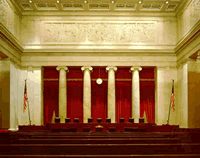False Claims Act Settlements and Finality After Kellogg Brown & Root, Inc. v U.S. ex rel Carter - Podcast
Corporations, Securities & Antitrust Practice Group Podcast
 On Tuesday, May 26, the U.S. Supreme Court decided Kellogg Brown & Root, Inc. v U.S. ex rel Carter, a case in which a private relator sought to bring a False Claims Act lawsuit against a government contractor for actions beyond the statute of limitations and that had been the subject of another relator’s lawsuit. The Supreme Court held that the claims outside of the statute of limitations could not be brought using a criminal tolling statute, but permitted other claims to proceed, despite having been dismissed in other lawsuits.
On Tuesday, May 26, the U.S. Supreme Court decided Kellogg Brown & Root, Inc. v U.S. ex rel Carter, a case in which a private relator sought to bring a False Claims Act lawsuit against a government contractor for actions beyond the statute of limitations and that had been the subject of another relator’s lawsuit. The Supreme Court held that the claims outside of the statute of limitations could not be brought using a criminal tolling statute, but permitted other claims to proceed, despite having been dismissed in other lawsuits.
Critics have noted that this ruling could make settling False Claims Act lawsuits brought by relators riskier for contractors. Why settle with one relator if another relator can then bring the same claim, given what the Supreme Court deemed the “interpretive challenges” of the False Claims Act? Also left unaddressed by the Supreme Court’s ruling is the Fourth Circuit’s broad holding that the United States is “at war” for purposes of the tolling statute even when there has neither been a formal declaration of war nor an authorization for the use of military force. Could contractors face criminal indictments for decades-old invoices so long as the United States remains involved in any conflict abroad? Our speakers provided expert analysis of the case and answered questions from the callers.
The panelists refered to a PowerPoint presentation available here.
- Christopher A. Bowen, Associate, Arent Fox LLP
- Marcia G. Madsen, Partner, Mayer Brown






